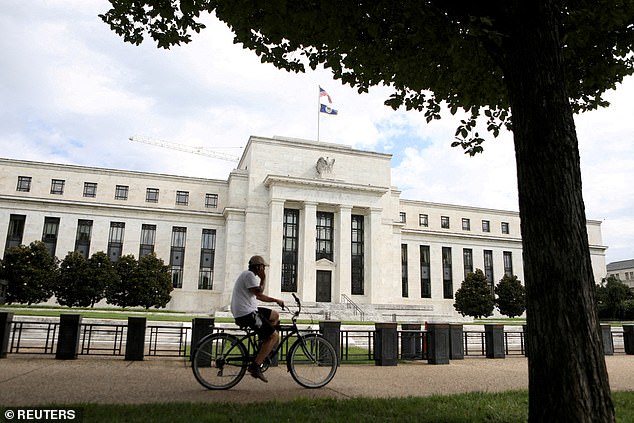The immense danger of the lengthy run-up of interest rates on both sides of the Atlantic was that the central banks would overdo the pain.
Central banks were badly scarred over failure to diagnose the onset of the great inflation. Printing presses were allowed to run for too long and low and negative interest rates prevailed.
What may have been misjudged is that an over-zealous monetary response to a cost of living crisis, largely caused by supply chain kinks, would do little to calm prices in the short-term.
It would, however, be an enormous blow to global output already hurt by surging energy costs.
Reality is hitting home. The American economy had an unexpectedly robust third quarter, expanding at a 4.9 per cent annual clip.

Rate freeze: The US Federal Reserve (pictured) has held its federal funds rate in the 5.25 %to 5.5% range, figuring it has done more than enough to quell inflation
In spite of this, the US central bank the Federal Reserve is in wait and see mode.
Last night it held its federal funds rate in the 5.25 to 5.5 per cent range, figuring it has done more than enough to quell inflation. Britain’s economy also has been resilient in the face of the Bank of England’s onslaught.
There are signs though that unless the Bank pauses today the outcomes could be calamitous.
The free market Institute of Economic Affairs notes that the money supply is contracting at a 4.1 per cent annual rate, which means that the availability of credit is contracting. It fears a recession.
Worryingly, insolvencies in the UK reached the highest level since the great financial crisis in the nine months to September.
The number of firms on the edge of a precipice increased markedly, says bankruptcy expert Begbies Traynor.
October’s purchasing managers’ index for manufacturing showed an improvement but, at current levels, it is still in downturn territory.
There is still life in the old bulldog yet and it would be crazy for the Bank to continue to squeeze and destroy output, jobs and tax income.
Against all expectations house prices, as measured by the Nationwide, rose by the largest amount since March 2022 in October.
On the High Street, Next is defying gravity, upgrading its profits outlook for the fourth time in six months.
All this at a time when the prices threat, with the possible exception of fuel, looks in retreat. Food prices are still rising but the pace of increase slowing.
Wages are no longer outpacing inflation in spite of near full employment. Consumer prices are on the way down so there is no point in reaching for the sledgehammer.
Breathing better
Slow build-up be damned! GSK’s respiratory disease vaccine arexvy is well on the road to blockbuster status, having racked up £700million of sales in the third quarter from a standing start.
Even more satisfying for UK life sciences, the success has been achieved in the face of a rival jab from Pfizer. GSK’s treatment has better efficacy and the roll-out, through the CVS pharmacy chain, is remarkable.
Stand-alone GSK, engineered by chief executive Emma Walmsley, is on a roll.
Pre-tax profits hit £1.8billion in the third quarter and, at £5.7billion so far this year, are 46 per cent higher.
The respiratory vaccine could soon be available at a surgery or pharmacy near you in Britain. Fast-track approval from the UK drugs agency was gained in July and it is already available privately. Talks with the NHS are ongoing.
But with the possibility of the vaccine emptying doctors’ surgeries, A&E departments and beds there is an overwhelming case for a British roll-out.
GSK’s other blockbuster vaccine, shingrix, is plateauing in the US. But a deal with China, protecting a vast over-60s population, means plenty of revenue to come.
One shadow over future prospects is the indigestion litigation brought by 79,000 complainants to the Delaware courts.
The case is due to be heard in January. Evidence against GSK is flimsy but the outcome unpredictable.
Terror mission
Until now the US war on crypto currency financing of terrorism largely has been conducted in secrecy.
Hamas’s barbaric assault on Israel is changing matters. This week the US deputy treasury secretary Wally Adeyemo has been in London to urge a co-ordinated crackdown on the way Hamas exploits crypto to circumvent sanctions.
It has concerns that, as other sources of funding dry up, crypto will become the last refuge.
Some links in this article may be affiliate links. If you click on them we may earn a small commission. That helps us fund This Is Money, and keep it free to use. We do not write articles to promote products. We do not allow any commercial relationship to affect our editorial independence.



